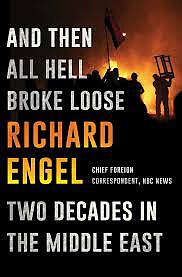Richard Engel knows the Middle East up close after 20 years of reporting throughout the region, from the demonstrations in Tahrir Square to the capture of Mosul by ISIS fighters in 2014. As the NBC News chief foreign correspondent, Engel has witnessed years of change and chaos in his exciting career. Readers can learn much from this book about Middle East politics and history, "And Then All Hell Broke Loose: Two Decades in the Middle East."
Engel had been fascinated with international news since his teen years, when he dreamed of living in Paris, leading a romantic expatriate life and reporting for the International Herald Tribune. After graduating from Stanford University in 1996, Engel decided the Middle East would be the story of his generation, so he packed two bags, took a few thousand dollars, and flew to Egypt, the largest country in the region. Settling in Cairo, he lived in a flophouse-type apartment among Egyptians with whom he became friendly and who helped him learn Arabic. He found work with the Middle Eastern Times and later did freelance work for ABC, the BBC World Service and other news organizations that paid his travel for reporting assignments.
The four years in Cairo became a fondly remembered time as his career heated up and he was dispatched to Jerusalem as a reporter for Agence France-Presse, covering major stories including the Camp David talks and the escalation of Israeli-Palestinian violence. After 9/11, the big story shifted to Iraq, where Engel witnessed a war that changed the status quo in the Middle East and unleashed "pent-up religious and ethnic hatred, creating a new generation of terrorists even more vicious than al-Qaeda."
Whether in Lebanon, Afghanistan or Syria, Engel has been on the front lines reporting every major crisis in the region. His book is both history and memoir. He describes the religious and ethnic conflicts that have fueled centuries of violence, the corruption and rule of countries by those he calls "Arab Big Men" (many of whom he met and interviewed: Hussein, Mubarak, Arafat and Gadhafi) and now the frightening increase of terrorism. He explains the background of Sunni-Shia differences, the outsized influence of the Wahabis in the Muslim world, the lingering impact of the Crusades and the Ottoman Empire, and the devastating mistakes of European and U.S. interventions. Engel provides clear and understandable explanations, as well as authoritative opinions about unfolding events.
As memoir, his narrative often reads like an espionage or adventure novel complete with safe houses, fake documents, smugglers and revolutionaries. He is candid about his ambition, journalistic competition and how his constant travel and lifestyle affected his personal life. He remembers how much he loved exploring the region and its cultural attractions, that happiness now replaced by fear.
What stood out for me were his observations about the appeal of ISIS to its recruits and militants: "By 2015, ISIS was attracting not only idealists but also a grab bag of off-kilter types: sociopaths aroused by bloodlust; loners and misfits who craved a sense of belonging; thrill seekers who wanted to test themselves in combat; Muslims in Europe and America who felt they were excluded from Western prosperity or demeaned by Western permissiveness; people who resented authority in any form; naifs seduced by slickly produced propaganda that gave violence a romantic patina."
Given the instability of the region, he hopes our diplomatic efforts and alliances will ensure peace, but as he said, "the Middle East has a way of sucking in great powers - and journalists."
Madeline Matson is reference and adult programming librarian at Missouri River Regional Library.

